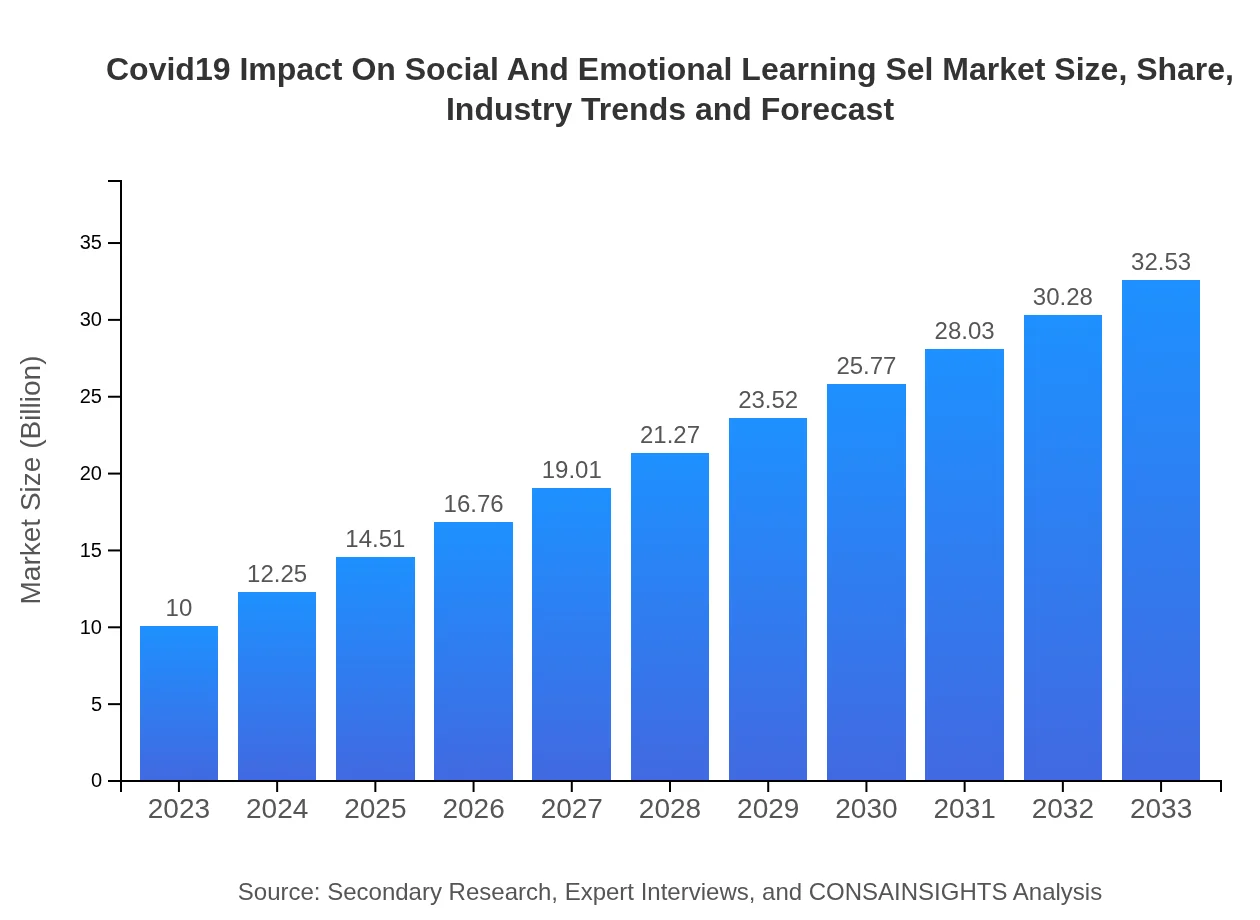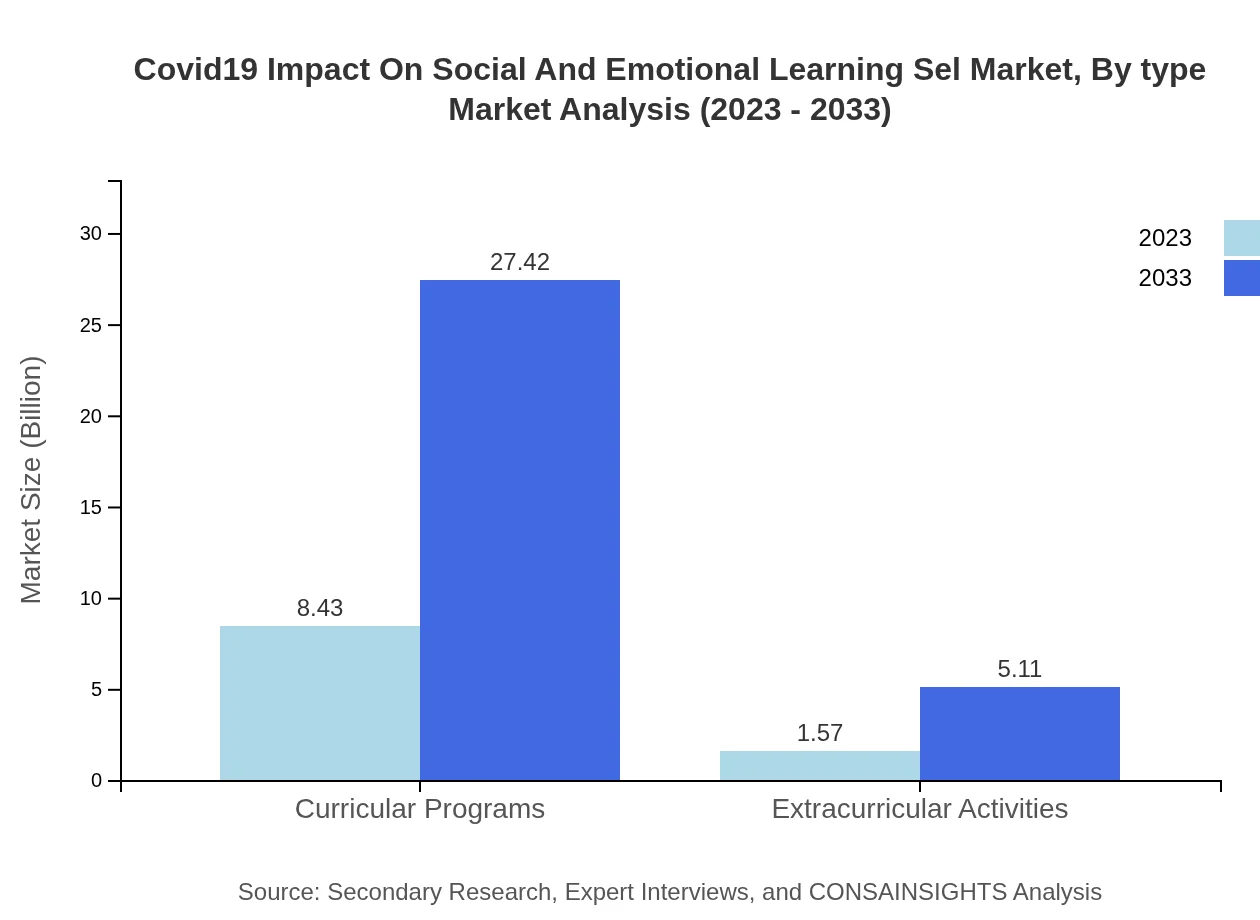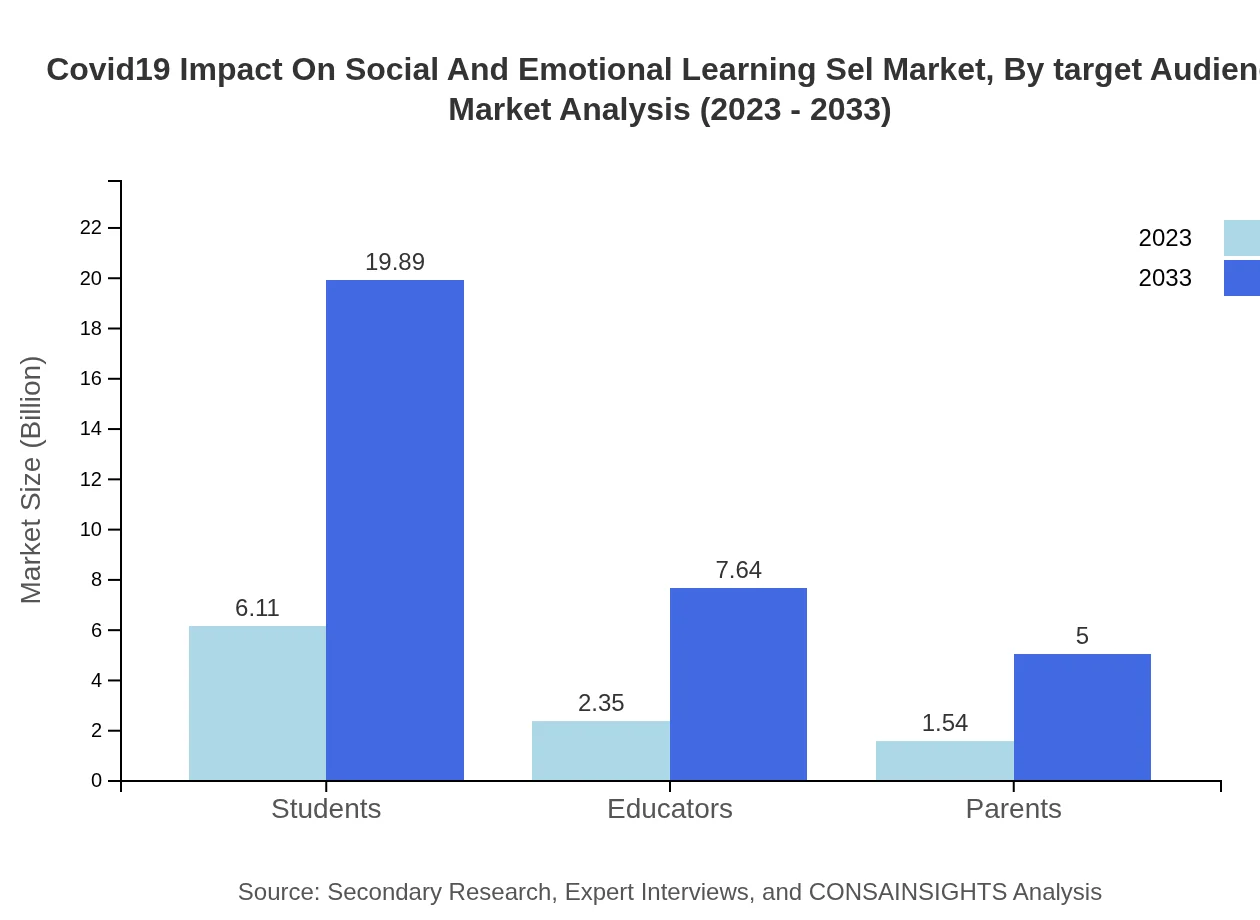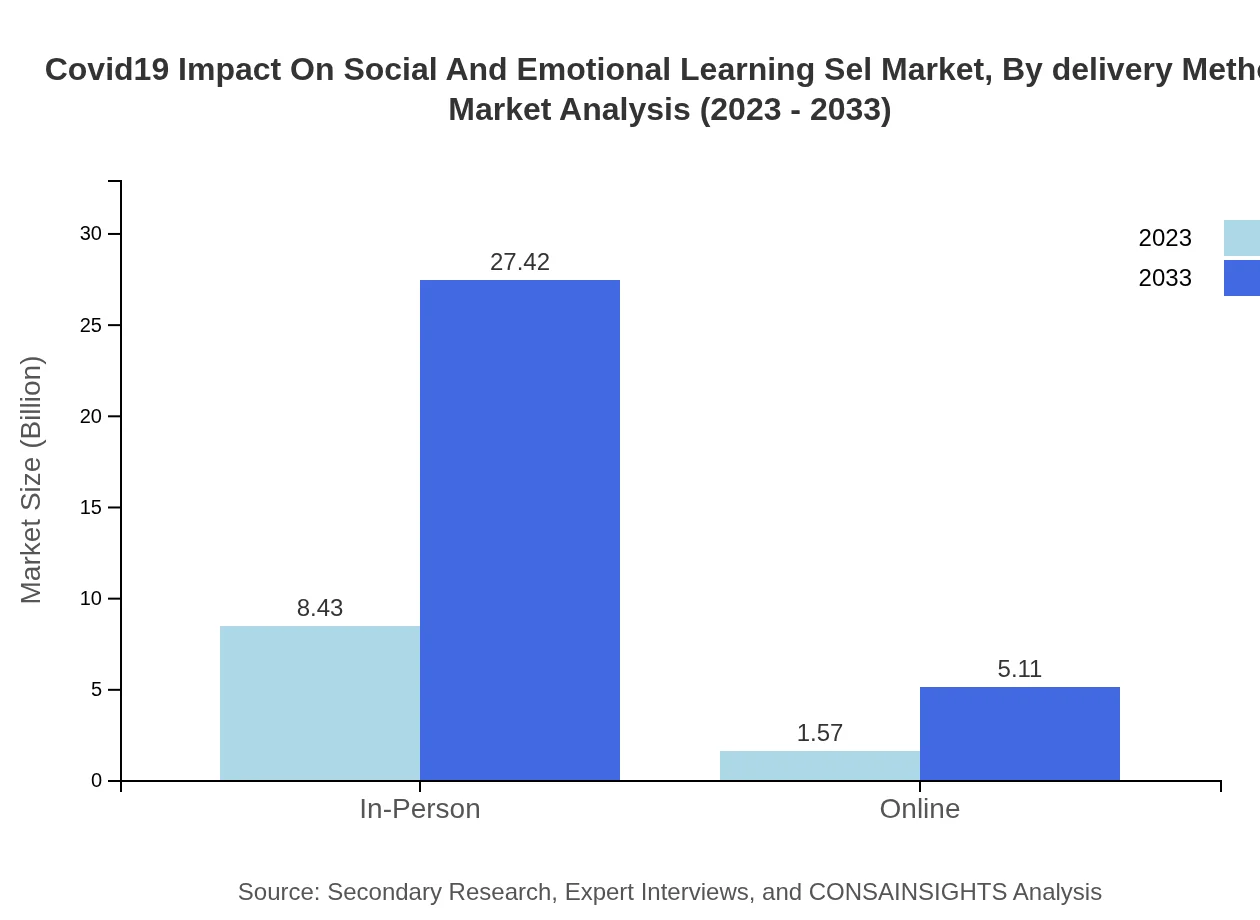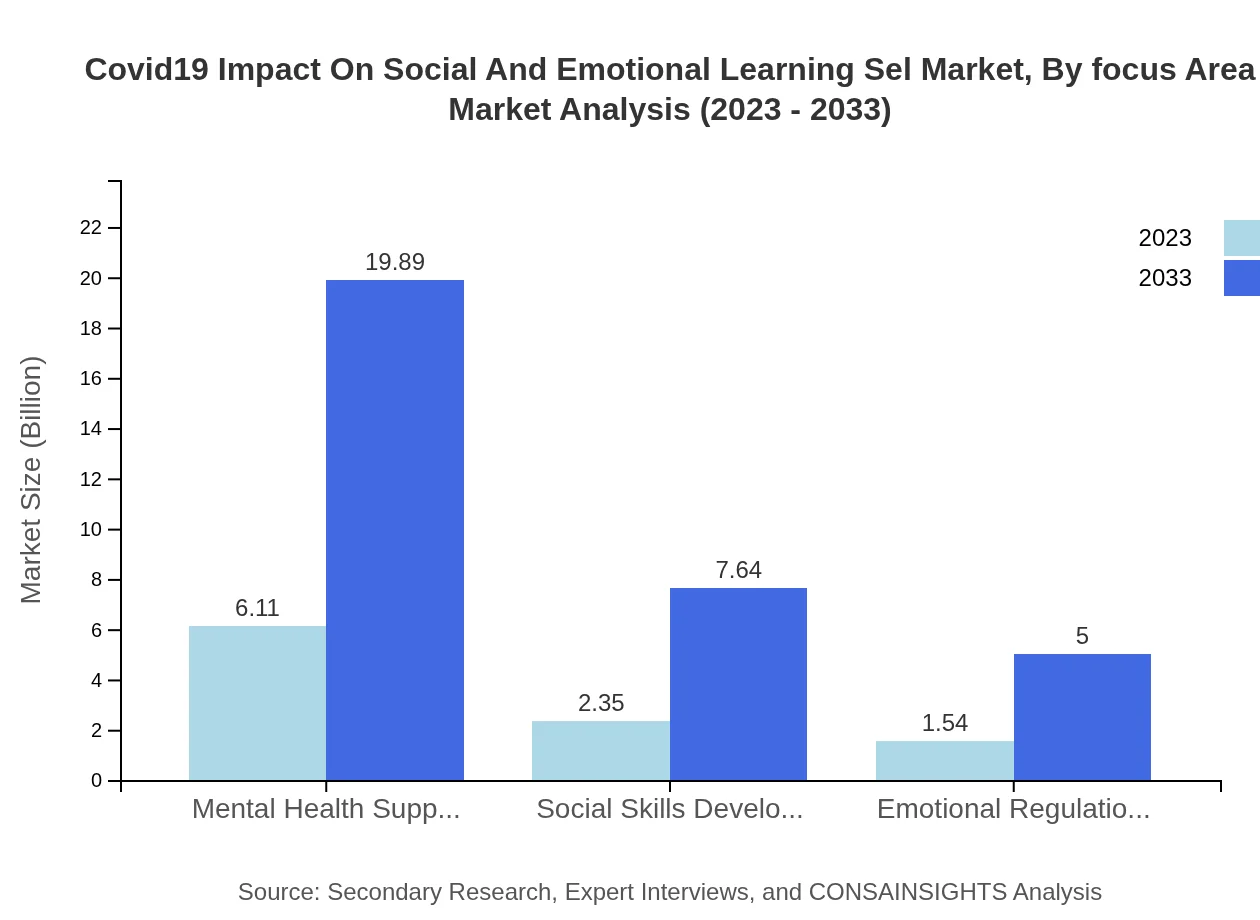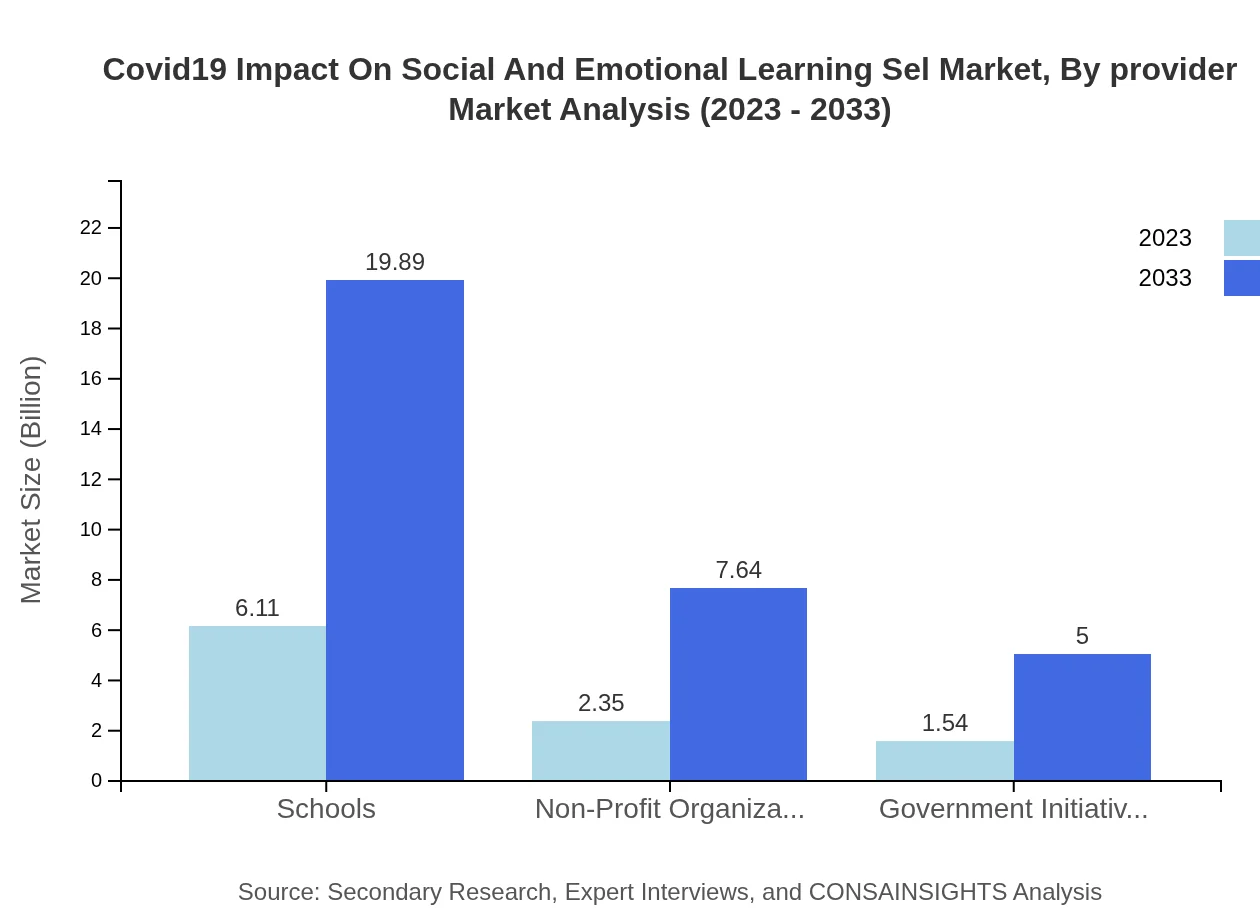Covid19 Impact On Social And Emotional Learning Sel Market Report
Published Date: 22 January 2026 | Report Code: covid19-impact-on-social-and-emotional-learning-sel
Covid19 Impact On Social And Emotional Learning Sel Market Size, Share, Industry Trends and Forecast to 2033
This report analyzes the impact of Covid19 on Social and Emotional Learning (SEL), providing insights into market trends, segmentation, and regional analysis from 2023 to 2033.
| Metric | Value |
|---|---|
| Study Period | 2023 - 2033 |
| 2023 Market Size | $10.00 Billion |
| CAGR (2023-2033) | 12% |
| 2033 Market Size | $32.53 Billion |
| Top Companies | CASEL (Collaborative for Academic, Social, and Emotional Learning), The Inner Resilience Program, The Yale Center for Emotional Intelligence, Second Step |
| Last Modified Date | 22 January 2026 |
Covid19 Impact On Social And Emotional Learning Sel Market Overview
Customize Covid19 Impact On Social And Emotional Learning Sel Market Report market research report
- ✔ Get in-depth analysis of Covid19 Impact On Social And Emotional Learning Sel market size, growth, and forecasts.
- ✔ Understand Covid19 Impact On Social And Emotional Learning Sel's regional dynamics and industry-specific trends.
- ✔ Identify potential applications, end-user demand, and growth segments in Covid19 Impact On Social And Emotional Learning Sel
What is the Market Size & CAGR of Covid19 Impact On Social And Emotional Learning Sel market in 2023?
Covid19 Impact On Social And Emotional Learning Sel Industry Analysis
Covid19 Impact On Social And Emotional Learning Sel Market Segmentation and Scope
Tell us your focus area and get a customized research report.
Covid19 Impact On Social And Emotional Learning Sel Market Analysis Report by Region
Europe Covid19 Impact On Social And Emotional Learning Sel Market Report:
Europe's market size will rise significantly from $3.00 billion in 2023 to $9.75 billion by 2033. Countries across Europe are enhancing their SEL policies and programs to foster resilience and emotional intelligence among students.Asia Pacific Covid19 Impact On Social And Emotional Learning Sel Market Report:
The Asia Pacific region is projected to grow from a market size of $2.13 billion in 2023 to $6.92 billion by 2033. The increasing focus on mental health initiatives, alongside educational reforms, contributes to the adoption of SEL frameworks across various countries, particularly in emerging economies.North America Covid19 Impact On Social And Emotional Learning Sel Market Report:
North America, leading the market, is expected to grow from $3.27 billion in 2023 to $10.64 billion in 2033. The robust infrastructure for SEL in schools and ongoing federal support for mental health initiatives drives this growth.South America Covid19 Impact On Social And Emotional Learning Sel Market Report:
South America is witnessing growth in SEL implementation, with market size expanding from $0.96 billion in 2023 to $3.11 billion by 2033. As governments and NGOs focus on inclusive education, SEL programs are increasingly recognized as essential for student well-being.Middle East & Africa Covid19 Impact On Social And Emotional Learning Sel Market Report:
The Middle East and Africa are anticipated to grow from $0.65 billion in 2023 to $2.11 billion by 2033. The emerging focus on mental health and well-being in educational policies is paving the way for increased SEL adoption.Tell us your focus area and get a customized research report.
Covid19 Impact On Social And Emotional Learning Sel Market Analysis By Type
Curricular Programs dominate with expected growth from $8.43 billion in 2023 to $27.42 billion by 2033, accounting for 84.3% share. Extracurricular Activities also see growth, moving from $1.57 billion to $5.11 billion, while government initiatives and mental health support programs gain traction.
Covid19 Impact On Social And Emotional Learning Sel Market Analysis By Target Audience
Students represent the largest segment, valued at $6.11 billion in 2023, with a share of 61.15%. Educators and parents also play crucial roles, with respective market sizes of $2.35 billion and $1.54 billion, underlining the holistic impact of SEL across educational stakeholders.
Covid19 Impact On Social And Emotional Learning Sel Market Analysis By Delivery Method
In-Person delivery methods maintain a strong foothold with a size of $8.43 billion in 2023, reflecting an 84.3% market share. However, online methods, while smaller ($1.57 billion), are expected to grow rapidly as digital integration continues.
Covid19 Impact On Social And Emotional Learning Sel Market Analysis By Focus Area
Mental Health Support leads with a size of $6.11 billion in 2023, emphasizing its critical role in SEL. Other focus areas such as Emotional Regulation Skills will see growth from $1.54 billion to $5.00 billion as focus on mental health becomes a priority.
Covid19 Impact On Social And Emotional Learning Sel Market Analysis By Provider
Schools are the primary providers, with a market size of $6.11 billion in 2023. Non-profit Organizations and Government Initiatives also enhance SEL reach, indicating diverse support channels.
Covid19 Impact On Social And Emotional Learning Sel Market Trends and Future Forecast
Tell us your focus area and get a customized research report.
Global Market Leaders and Top Companies in Covid19 Impact On Social And Emotional Learning Sel Industry
CASEL (Collaborative for Academic, Social, and Emotional Learning):
CASEL is a leading organization focused on integrating social and emotional learning into educational practices, creating resources and frameworks for schools nationwide.The Inner Resilience Program:
This non-profit organization develops SEL curricula aimed at building resilience and emotional health in children and teens through innovative program design and training.The Yale Center for Emotional Intelligence:
This research center focuses on providing evidence-based SEL practices that improve the emotional intelligence of students and educators, contributing significantly to the field.Second Step:
Second Step offers comprehensive SEL programs for early learning and K-12 that promote social-emotional competence and academic success.We're grateful to work with incredible clients.









FAQs
What is the market size of covid19 Impact On Social And Emotional Learning Sel?
The covid19 impact on Social and Emotional Learning (SEL) market is projected to reach approximately $10 billion by 2033, growing at a compound annual growth rate (CAGR) of 12% from 2023.
What are the key market players or companies in this covid19 Impact On Social And Emotional Learning Sel industry?
Key players in the COVID-19 impact on Social and Emotional Learning (SEL) industry include educational technology firms, non-profit organizations focused on mental health, and government bodies that promote educational initiatives. They drive innovation and provide essential resources.
What are the primary factors driving the growth in the covid19 Impact On Social And Emotional Learning Sel industry?
The growth of the covid19 impact on SEL industry is driven by increasing awareness of the importance of mental health, the rise of digital learning platforms, and government initiatives aimed at integrating SEL into curriculums across educational institutions.
Which region is the fastest Growing in the covid19 Impact On Social And Emotional Learning Sel?
The Asia Pacific region is the fastest-growing market for covid19 impact on Social and Emotional Learning (SEL), projected to grow from $2.13 billion in 2023 to approximately $6.92 billion by 2033, reflecting strong investment in education and mental health.
Does ConsaInsights provide customized market report data for the covid19 Impact On Social And Emotional Learning Sel industry?
Yes, ConsaInsights offers customized market report data tailored to specific needs within the covid19 impact on Social and Emotional Learning (SEL) industry, ensuring that clients receive relevant insights for strategic decision-making.
What deliverables can I expect from this covid19 Impact On Social And Emotional Learning Sel market research project?
Deliverables for the covid19 impact on Social and Emotional Learning (SEL) market research project include detailed market analysis reports, segmentation data, regional insights, and projections, as well as competitive landscape assessments to inform strategy.
What are the market trends of covid19 Impact On Social And Emotional Learning Sel?
Current trends in the covid19 impact on Social and Emotional Learning (SEL) market include increased digital transformation in education, heightened emphasis on mental health curriculums, and collaborative initiatives between schools and mental health organizations.

